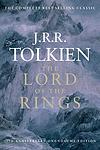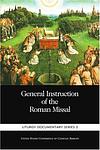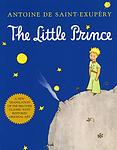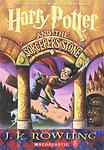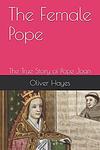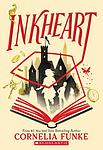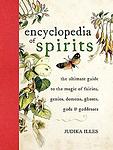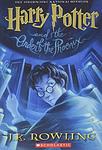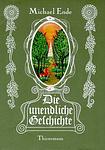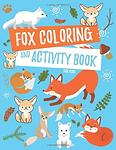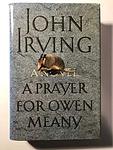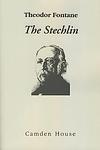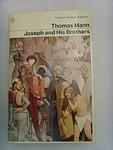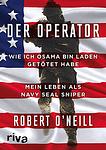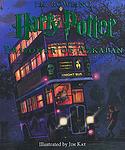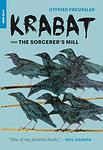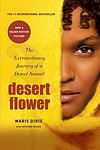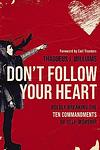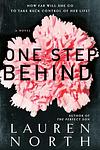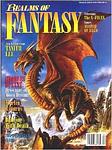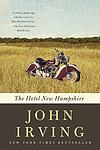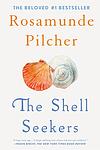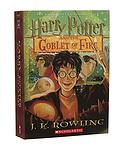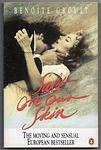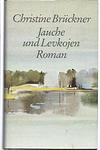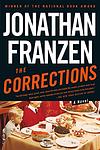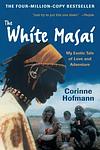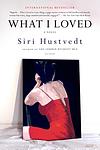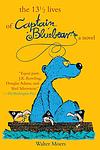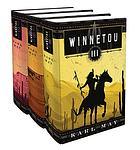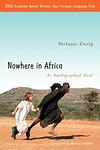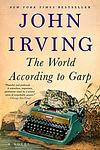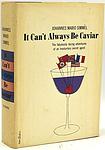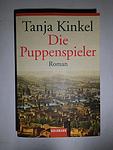Big Read (German)
This is one of the 284 lists we use to generate our main The Greatest Books list.
-
The Lord of the Rings by J. R. R. Tolkien
This epic high-fantasy novel centers around a modest hobbit who is entrusted with the task of destroying a powerful ring that could enable the dark lord to conquer the world. Accompanied by a diverse group of companions, the hobbit embarks on a perilous journey across Middle-earth, battling evil forces and facing numerous challenges. The narrative, rich in mythology and complex themes of good versus evil, friendship, and heroism, has had a profound influence on the fantasy genre.
-
The Bible by Unknown
The Bible is the central religious text of Christianity, comprising the Old and New Testaments. It features a diverse collection of writings including historical narratives, poetry, prophecies, and teachings. These texts chronicle the relationship between God and humanity, detail the life, death, and resurrection of Jesus Christ, and follow the early Christian church. Considered divinely inspired by believers, it serves as a foundational guide for faith and practice, influencing countless aspects of culture and society worldwide.
-
The Pillars Of The Earth by Ken Follett
Set in the 12th century, the novel is a sweeping epic of good and evil, treachery and intrigue, violence and beauty. It revolves around the construction of a cathedral in the fictional town of Kingsbridge, England. The story is centered on the lives of three main characters: a master builder, a monk, and a noblewoman, whose destinies are intertwined with the building of the cathedral and the tumultuous events of the time, including war, religious strife, and power struggles.
-
Perfume by Patrick Suskind
Set in 18th-century France, this novel tells the story of Jean-Baptiste Grenouille, a man born with an extraordinary sense of smell but no personal scent of his own. He becomes an apprentice to a prominent perfumer and learns to create the world's most intoxicating perfumes. However, his obsession with capturing the perfect scent leads him down a dark path, as he begins to kill young women to extract their scent. The book is a chilling exploration of obsession, identity, and the power of scent.
-
The Little Prince by Antoine de Saint-Exupéry
A young prince from a tiny asteroid embarks on a journey across the universe, visiting various planets and meeting their strange inhabitants. Along the way, he learns about the follies and absurdities of the adult world, the nature of friendship, and the importance of retaining a childlike wonder and curiosity. His journey eventually leads him to Earth, where he befriends a fox and learns about love and loss before finally returning to his asteroid.
-
Buddenbrooks by Thomas Mann
"Buddenbrooks" is a novel that chronicles the decline of a wealthy north German merchant family over the course of four generations. The narrative focuses on the fluctuating fortunes and internal struggles of the family, reflecting the societal changes and economic decline of the period. The family's personal and business relationships, their moral values, and their struggle to maintain social status are all explored against the backdrop of the changing political and social landscape.
-
The Physician by Noah Gordon
The book tells the story of a young English boy, Rob Cole, in the 11th century who becomes an apprentice to a barber-surgeon. Rob's ambition to become a physician takes him across Europe and into the heart of the Muslim world, a journey fraught with danger and discovery. He disguises himself as a Jew to study at a school that does not admit Christians. The narrative is a captivating mix of history, science, and adventure, highlighting the protagonist's perseverance and the state of medical knowledge during the Middle Ages.
-
The Alchemist by Paulo Coelho
A young Andalusian shepherd named Santiago dreams of finding a worldly treasure and sets off on a journey across the Egyptian desert in search of it. Along the way, he encounters a series of characters who impart wisdom and help guide his spiritual journey. The novel explores themes of destiny, personal legend, and the interconnectedness of all things in the universe. The boy learns that true wealth comes not from material possessions, but from self-discovery and attaining one's "Personal Legend".
-
Harry Potter And The Philosopher's Stone by J. K Rowling
The story follows a young boy, Harry Potter, who learns on his 11th birthday that he is the orphaned son of two powerful wizards and possesses unique magical powers of his own. He is summoned from his life as an unwanted child to become a student at Hogwarts, an English boarding school for wizards. There, he meets several friends who become his closest allies and help him discover the truth about his parents' mysterious deaths, the dark wizard who wants to kill him, and the magical stone that holds immense power.
-
Pope Joan by Donna Cross
The novel is a historical fiction that tells the story of a young woman in the 9th century who, driven by her thirst for knowledge and desire for education, defies the societal norms of her time. Disguising herself as a man, she rises through the ranks of the church hierarchy, ultimately becoming Pope. Her journey is fraught with challenges and dangers, as she navigates a life of deception while striving to maintain her secret identity. The story explores themes of gender, religion, and power, as it weaves a tale of a remarkable figure who, according to legend, may have challenged the male-dominated history of the Papacy.
-
Inkheart by Cornelia Funke
The book revolves around a young girl named Meggie and her father Mo, who possesses a unique ability to bring characters from books to life by reading aloud. This gift, however, comes with a price, as they are entangled in a dangerous adventure when a villain from a fantasy book called "Inkheart" is accidentally summoned into the real world. As they struggle to fix the chaos caused by this crossover, they must navigate a treacherous world of magic and betrayal, while attempting to thwart the villain's sinister plans and protect the balance between reality and the fantastical realms of literature.
-
Cross Stitch by Diana Gabaldon
The novel is a historical romance that blends adventure, love, and time travel. It follows the story of a World War II combat nurse who is mysteriously swept back in time to 18th-century Scotland. There, she encounters clan rivalries, the harsh realities of life in the past, and a gallant Scottish warrior with whom she falls deeply in love. As she becomes entangled in the intrigues and dangers of a world that is not her own, she must navigate her dual existence and decide where her heart truly belongs.
-
The House of the Spirits by Isabel Allende
"The House of the Spirits" is a multi-generational saga that explores the lives of the Trueba family, set against the backdrop of political upheaval in an unnamed Latin American country. The narrative is driven by the family's strong and magical women, including clairvoyant Clara and her granddaughter Alba. The story spans over three generations, weaving together personal, social, and political threads, and is rich in elements of magical realism. The novel explores themes of love, violence, social class, and the struggle for power.
-
The Reader by Bernhard Schlink
"The Reader" is a poignant narrative centered around a young German boy's complex relationship with an older woman, who later turns out to be a former Auschwitz guard. Their relationship begins with her teaching him to read, but takes a drastic turn when she disappears, only to reemerge on trial for war crimes. The novel explores themes of guilt, shame, and redemption, as the boy, now a law student, grapples with his feelings for a woman he once loved, but whose past actions he cannot reconcile with.
-
Faust by Johann Wolfgang von Goethe
The book is a tragic play in two parts that tells the story of a scholarly man named Faust, who becomes dissatisfied with his life and makes a pact with the devil, Mephistopheles. In exchange for unlimited knowledge and worldly pleasures, Faust agrees to give his soul to Mephistopheles after death. The narrative explores themes of ambition, despair, love, and redemption, ultimately leading to Faust's salvation.
-
The Shadow of the Wind by Carlos Ruiz Zafon
The novel follows the story of a young boy in post-war Barcelona, who discovers a mysterious book in a hidden library that his father takes him to, which houses forgotten books. The boy becomes captivated by the book and its author, but as he grows older, he realizes that someone is destroying all books written by this author. As he delves deeper into the mystery, the boy's life becomes intertwined with the author's, revealing a dark and tragic past that someone wants to be kept hidden. The story is a mix of romance, mystery, and a historical narrative set against the turbulent backdrop of a city recovering from war.
-
Pride and Prejudice by Jane Austen
Set in early 19th-century England, this classic novel revolves around the lives of the Bennet family, particularly the five unmarried daughters. The narrative explores themes of manners, upbringing, morality, education, and marriage within the society of the landed gentry. It follows the romantic entanglements of Elizabeth Bennet, the second eldest daughter, who is intelligent, lively, and quick-witted, and her tumultuous relationship with the proud, wealthy, and seemingly aloof Mr. Darcy. Their story unfolds as they navigate societal expectations, personal misunderstandings, and their own pride and prejudice.
-
The Name of the Rose by Umberto Eco
Set in a wealthy Italian monastery in the 14th century, the novel follows a Franciscan friar and his young apprentice as they investigate a series of mysterious deaths within the monastery. As they navigate the labyrinthine library and decipher cryptic manuscripts, they uncover a complex plot involving forbidden books, secret societies, and the Inquisition. The novel is a blend of historical fiction, mystery, and philosophical exploration, delving into themes of truth, knowledge, and the power of the written word.
-
Angels & Demons by Dan Brown
In this fast-paced thriller, a renowned symbologist is called to the Swiss research facility CERN to investigate a mysterious symbol seared into the chest of a murdered physicist. His investigation leads him to the Vatican City, where he uncovers the resurgence of an ancient secret brotherhood known as the Illuminati. As a conclave is underway to elect a new Pope, the symbologist and a gifted Italian scientist race against time to prevent a powerful time bomb from destroying the Vatican. They embark on a frantic hunt through sealed crypts, dangerous catacombs, and deserted cathedrals, following a 400-year-old trail of ancient symbols that snake across Rome to the long-forgotten Illuminati lair.
-
Effi Briest by Theodor Fontane
This novel explores the life of a 17-year-old girl who is married off to a much older man, a high-ranking official, for the sake of social and financial stability. Despite her husband's devotion, she embarks on a passionate, but doomed affair with a charming, yet manipulative, major. The affair ends disastrously, leading to her social ostracization and eventual descent into loneliness and despair. The book serves as a critique of the rigid Prussian society of the late 19th century.
-
Harry Potter and the Order of the Phoenix by J. K Rowling
In the fifth installment of this iconic series, the young wizard Harry Potter returns for his fifth year at Hogwarts School of Witchcraft and Wizardry, only to discover that much of the wizarding world, including the Ministry of Magic, is in denial about the teenager's recent encounter with the evil Lord Voldemort. Harry is also beset by disturbing dreams while the sinister prison guards of Azkaban have been stationed at Hogwarts to protect the school, and Harry's budding abilities as a wizard are put to the test. Meanwhile, a secret society, the Order of the Phoenix, is working to fight Voldemort and his followers, and Harry's role in the coming conflict is becoming ever more significant.
-
The Magic Mountain by Thomas Mann
In this novel, the protagonist, a young, ordinary man, visits his cousin at a tuberculosis sanatorium in the Swiss Alps. Intending to stay for only a few weeks, he ends up remaining there for seven years, becoming a patient himself. The book explores his experiences and relationships with other patients and staff, delving into philosophical discussions on life, time, and the nature of disease. It also provides a vivid portrayal of the European society and intellectual life on the eve of World War I.
-
Gone With the Wind by Margaret Mitchell
Set against the backdrop of the American Civil War and Reconstruction era, this novel follows the life of a young Southern belle, who is known for her beauty and charm. Her life takes a turn when she is forced to make drastic changes to survive the war and its aftermath. The story revolves around her struggle to maintain her family's plantation and her complicated love life, especially her unrequited love for a married man, and her tumultuous relationship with a roguish blockade runner.
-
Siddhartha by Hermann Hesse
"Siddhartha" is a novel about the spiritual journey of a young man named Siddhartha during the time of Gautama Buddha. Born into an Indian Brahmin family, Siddhartha rejects his privileged life to seek spiritual enlightenment. His journey takes him through periods of harsh asceticism, sensual indulgence, material wealth, and finally, to the simple life of a ferryman on a river where he finds peace and wisdom. The book explores themes of self-discovery, spiritual quest, and the desire for a meaningful life.
-
The Discovery of Heaven by Harry Mulisch
"The Discovery of Heaven" is a philosophical novel that explores the relationship between mankind and the divine. The story revolves around two friends, an astronomer and a philologist, who are manipulated by heavenly forces to father a child who is destined to return the Ten Commandments to God. As the narrative unfolds, it delves into complex themes such as friendship, love, art, science, and the existence of God, presenting a thought-provoking analysis of the human condition.
-
The Neverending Story by Michael Ende
"The Neverending Story" is a captivating fantasy novel that follows the adventures of a young boy named Bastian. When he stumbles upon a mysterious book, he becomes engrossed in the magical world of Fantastica, where he must embark on a perilous quest to save the realm from destruction. As Bastian's imagination intertwines with reality, he discovers the power of storytelling and the importance of believing in oneself. This enchanting tale explores themes of courage, friendship, and the boundless nature of imagination.
-
The Hidden Word by Ulla Hahn
"The Hidden Word" is a poignant coming-of-age novel set in post-war Germany, which follows the life of a young girl from a conservative, working-class family as she discovers the transformative power of language and literature. Struggling against the constraints of her rural, religious upbringing and the societal expectations placed upon women of her time, she seeks solace and freedom in the world of books. Her intellectual and emotional journey is marked by the tension between her burgeoning individuality and the traditional values she is expected to uphold, leading to a narrative rich in both personal growth and the exploration of the capacity of words to both conceal and reveal profound truths.
-
Angela's Ashes: A Memoir by Frank McCourt
This memoir is a profound and heart-wrenching account of the author's impoverished childhood in Limerick, Ireland, during the 1930s and 1940s. The story is filled with tales of survival in the face of extreme poverty, an alcoholic father, a struggling mother, and the deaths of three siblings. Despite the harsh circumstances, the narrative is infused with a sense of humor and hope, demonstrating the resilience of the human spirit.
-
Narcissus And Goldmund by Hermann Hesse
The novel explores the complex friendship between two diametrically opposed characters: one, a cerebral and ascetic monk dedicated to a life of contemplation and spiritual discipline, and the other, a passionate and sensual artist driven by the pursuit of beauty and worldly experiences. Set against the backdrop of medieval Europe, the story delves into themes of duality, the search for meaning, and the reconciliation of the spiritual with the carnal. As the two men journey through their lives, their intertwined paths lead them to profound insights about the nature of human existence, creativity, and the eternal struggle between the intellect and the senses.
-
The Mists of Avalon by Marion Zimmer Bradley
This novel reimagines the Arthurian legends from the perspectives of the women involved. It centers around Morgaine, Arthur's half-sister, who is a priestess of Avalon, and Gwenhwyfar, Arthur's queen. The story explores their roles in the political and spiritual conflicts that arise as Christianity begins to replace the old pagan ways. It delves into themes of love, loyalty, and power, while offering a fresh take on a classic tale.
-
The German Lesson by Siegfried Lenz
"The German Lesson" is a vivid exploration of the moral and cultural conflicts of World War II, set in a small German village. The story is narrated by a young boy who is tasked by his school teacher with an assignment to write an essay on "The Joys of Duty." As his father, a local police officer, is assigned the duty of preventing a popular local artist from painting, the boy finds himself torn between his father's rigid adherence to duty and his own growing appreciation for art and individual expression. The narrative grapples with themes of duty, obedience, and the power of art, providing a thoughtful examination of life under the Nazi regime.
-
Embers by Sandor Marai
"Embers" is a novel about two old friends who reunite after being apart for 41 years. The story takes place in a secluded castle in the Carpathian Mountains, where the two men confront each other about a long-kept secret that has kept them apart. The narrative delves into themes of friendship, love, loyalty, and betrayal, while exploring the intricate dynamics of human relationships. The novel is a poignant examination of the nature of time and memory, and the ways in which they can shape and define our lives.
-
Homo Faber by Max Frisch
"Homo Faber" is a novel about a man named Walter Faber, a highly rational and logical Swiss engineer who believes strongly in technology and progress. His life is turned upside down when he survives a plane crash in the Mexican desert, falls in love with a young woman who turns out to be his daughter, and then loses her to a tragic death. This series of events forces him to question his faith in technology and confront the irrationality of life.
-
The Discovery Of Slowness by Sten Nadolny
The novel is a historical and philosophical exploration of the life of the 19th-century British explorer Sir John Franklin, reimagined through the lens of his unique perception of time. It delves into Franklin's character, portraying him as a man who experiences the world at a slower pace than those around him, allowing for deep reflection and a profound connection to his surroundings. This narrative approach offers a meditation on the virtues of slowness in a rapidly changing world, challenging the reader to reconsider the value of patience and careful thought in an era that increasingly prioritizes speed and efficiency.
-
The Unbearable Lightness of Being by Milan Kundera
Set against the backdrop of the Prague Spring period of Czechoslovak history, the novel explores the philosophical concept of Nietzsche's eternal return through the intertwined lives of four characters: a womanizing surgeon, his intellectual wife, his naïve mistress, and her stoic lover. The narrative delves into their personal struggles with lightness and heaviness, freedom and fate, love and betrayal, and the complexities of human relationships, all while offering a profound meditation on the nature of existence and the paradoxes of life.
-
One Hundred Years of Solitude by Gabriel Garcia Marquez
This novel is a multi-generational saga that focuses on the Buendía family, who founded the fictional town of Macondo. It explores themes of love, loss, family, and the cyclical nature of history. The story is filled with magical realism, blending the supernatural with the ordinary, as it chronicles the family's experiences, including civil war, marriages, births, and deaths. The book is renowned for its narrative style and its exploration of solitude, fate, and the inevitability of repetition in history.
-
A Prayer for Owen Meany by John Irving
The book is a tale of two childhood friends, one of whom believes he is God's instrument. The story is set in a New England town during the 1950s and 1960s and follows the lives of the two boys, one small and with a strange voice, who has visions of his own death and believes he is an instrument of God, and the other, the narrator, who struggles with faith. The novel explores themes of faith, fate, and the power of friendship against a backdrop of historical and political events, including the Vietnam War.
-
Sophie's World: A Novel About the History of Philosophy by Jostein Gaarder
"Sophie's World" is a unique and intriguing novel that intertwines the narrative of a young girl named Sophie with a comprehensive history of Western philosophy. Sophie begins receiving mysterious letters from an unknown philosopher and gradually becomes engrossed in the world of philosophy. The book uses Sophie's journey to explore philosophical concepts and theories, from ancient to modern times, in an accessible and engaging way, making it an excellent introduction to the subject for readers of all ages.
-
The Hitchhiker's Guide to the Galaxy by Douglas Adams
This comedic science fiction novel follows the intergalactic adventures of an unwitting human, Arthur Dent, who is rescued just before Earth's destruction by his friend Ford Prefect, a researcher for a galactic travel guide. Together, they hitch a ride on a stolen spaceship, encountering a range of bizarre characters, including a depressed robot and a two-headed ex-president of the galaxy. Through a series of satirical and absurd escapades, the book explores themes of existentialism, bureaucracy, and the absurdity of life, all while poking fun at the science fiction genre and offering witty commentary on the human condition.
-
The Wall by Marlen Haushofer
The book is a profound exploration of isolation and survival, following a woman who finds herself unexpectedly cut off from the rest of the world by an invisible, impenetrable wall. With the rest of humanity seemingly vanished, she must come to terms with her solitary existence in a remote forested area, accompanied only by a few animals. As she adapts to her new reality, tending to the land and the creatures that become her companions, the narrative delves into themes of self-reliance, the intrinsic connection between humans and nature, and the resilience of the human spirit in the face of unimaginable circumstances. Through her introspective journey, the protagonist examines the essence of her being and the meaning of life when stripped of society and its constructs.
-
The Cider House Rules by John Irving
This novel tells the story of Dr. Wilbur Larch—saint and obstetrician, founder and director of the orphanage in the town of St. Cloud's, Maine, and a man of rare compassion and an addiction to ether. Dr. Larch loves all his orphans, especially Homer Wells, who is never adopted and becomes his invaluable apprentice. As Homer comes of age, he must leave the only home he's ever known to explore the world outside, a world filled with temptations and moral dilemmas, from the struggle over abortion to the question of what constitutes a family.
-
Love in the Time of Cholera by Gabriel Garcia Marquez
This novel follows the story of Florentino Ariza and Fermina Daza, who fall passionately in love in their youth. However, Fermina eventually marries a wealthy doctor, leaving Florentino heartbroken. Despite this, Florentino remains devoted to Fermina for over fifty years, patiently waiting for her husband's death to have another chance at her love. The story is set against the backdrop of a cholera epidemic, serving as a metaphor for the transformative power of love and the destructive power of obsession.
-
The Stechlin by Theodor Fontane
"The Stechlin" is a social novel set in late 19th-century Germany that explores the changes and tensions brought about by the modern world. The story follows an aging aristocrat who lives near Lake Stechlin and his interactions with the community around him, including his son who is a member of the Reichstag in Berlin. The novel is known for its detailed and realistic depiction of the social and political climate of the time, as well as its exploration of the conflict between traditional values and modernity.
-
Steppenwolf by Hermann Hesse
The novel presents a poignant exploration of a man's struggle with his dual nature. The protagonist, a middle-aged man, finds himself torn between his humanistic, intellectual tendencies and his more primitive, wolf-like instincts. As he navigates his way through the surreal and sometimes hallucinatory world, he encounters various characters who challenge his views and push him towards self-discovery and transformation. The narrative delves into themes of alienation, the subconscious mind, and the search for meaning in life.
-
To Kill a Mockingbird by Harper Lee
Set in the racially charged South during the Depression, the novel follows a young girl and her older brother as they navigate their small town's societal norms and prejudices. Their father, a lawyer, is appointed to defend a black man falsely accused of raping a white woman, forcing the children to confront the harsh realities of racism and injustice. The story explores themes of morality, innocence, and the loss of innocence through the eyes of the young protagonists.
-
Joseph and His Brothers by Thomas Mann
This novel is a re-imagining of the biblical story of Joseph, known for his coat of many colors. The narrative delves deeply into the psychological aspects of each character, exploring their motivations, flaws, and virtues. The story covers Joseph's life from his early years in Canaan, through his betrayal by his brothers who sell him into slavery in Egypt, his rise to power in Pharaoh's court, and his eventual reconciliation with his brothers. The novel is a rich tapestry of dreams, myths, and rituals, blending biblical tradition with the author's own philosophical insights.
-
Der Laden by Erwin Strittmatter
The book is a richly detailed, autobiographical trilogy that paints a vivid portrait of village life in Germany through the first half of the 20th century. It follows the life of Esau Matt, a baker's son, as he grows up during the tumultuous times of the Weimar Republic, the rise of National Socialism, and the Second World War. The narrative delves into the everyday experiences of the villagers, their struggles, and their resilience, capturing the social and political changes of the era through the lens of a small community and the coming-of-age story of its protagonist.
-
The Tin Drum by Günter Grass
The novel tells the story of Oskar Matzerath, a boy who decides on his third birthday that he will stop growing and remain a three-year-old forever. Oskar is gifted with a tin drum by his mother, which he uses to express his emotions and thoughts. Living in Danzig during the rise of Nazi Germany, Oskar's refusal to grow is a form of protest against the adult world. The book is a blend of magical realism and historical fiction, providing a unique perspective on the horrors of World War II and the post-war era in Germany.
-
All Quiet on the Western Front by Erich Maria Remarque
The novel tells the story of a young German soldier, Paul Bäumer, and his experiences during World War I. The narrative explores the physical and emotional toll of war, the camaraderie between soldiers, and the disillusionment of a generation thrown into a brutal conflict. The protagonist and his friends grapple with survival, fear, and the loss of innocence, providing a stark and poignant critique of the futility and destructiveness of war.
-
The Swarm by Frank Schatzing
"The Swarm" is a science fiction novel that explores the disastrous consequences of mankind's exploitation of the world's oceans. The narrative follows a group of scientists around the world as they try to understand a series of inexplicable, catastrophic natural disasters. They eventually discover that these events are not random but are the result of a collective intelligence in the sea, a swarm of marine life that has decided to fight back against humanity's destruction of their habitat. The book combines elements of ecological thriller, disaster novel, and speculative fiction as it explores the potential consequences of human interference with the natural world.
-
The Notebook: The Proof ; The Third Lie : Three Novels by Agota Kristof
"The Notebook: The Proof ; The Third Lie : Three Novels" is a trilogy of novels that follow the lives of twin brothers, living through the harsh realities of war, separation, and betrayal. The first novel, "The Notebook," tells the story of their survival as children in a rural town at the end of World War II. The second book, "The Proof," continues their story into adulthood, exploring the effects of their traumatic childhood. The final book, "The Third Lie," delves into the complexities of their relationship and the secrets they kept from one another. The trilogy is a poignant exploration of identity, love, and the enduring bond of brotherhood.
-
Harry Potter And The Prisoner Of Azkaban by J. K Rowling
In this third installment of the popular fantasy series, the protagonist enters his third year at a magical school, only to find out that a notorious prisoner has escaped from a supposedly inescapable prison and is believed to be after him. As the school year progresses, he learns more about his parents' history, uncovers secrets about his professor, and discovers a magical map. He also learns to summon a powerful defensive spell, confronts the escaped prisoner, and uncovers the truth about his parents' betrayal and death. The book ends with him saving an innocent life and learning a valuable lesson about the complexity of human nature and the importance of true friendship.
-
Momo by Michael Ende
"Momo" by Michael Ende is a captivating tale about a young orphan girl named Momo who possesses an extraordinary ability to listen and understand people. Set in a town plagued by time thieves, Momo's unique gift becomes crucial as she embarks on a quest to save the community from losing their most precious possession: time. With the help of her loyal friends, Momo must confront the enigmatic Men in Grey and their sinister plan to rob people of their time, teaching readers the importance of cherishing the present moment and the power of human connection.
-
Anniversaries by Uwe Johnson
"Anniversaries" is a novel that provides a detailed account of a year in the life of Gesine Cresspahl, a German immigrant living in New York City with her young daughter. The narrative unfolds through daily entries, spanning from August 1967 to August 1968, intertwining the protagonist's present-day experiences with her traumatic past in Nazi and post-war East Germany. The novel explores themes of memory, identity, displacement, and the complexities of history, offering a nuanced perspective on the immigrant experience and the lasting impacts of historical trauma.
-
Mutant Message Down Under by Marlo Morgan
The book is a fictional account presented as a true story about an American woman's spiritual odyssey through the Australian Outback. Accompanied by a group of Aboriginal people, she embarks on a four-month-long walkabout, during which she learns about their culture, beliefs, and connection to the land. The journey is transformative, challenging her Western values and perspectives as she gains insights into the wisdom and customs of her hosts. The narrative explores themes of environmentalism, spirituality, and the clash between modern civilization and traditional ways of life.
-
The Catcher in the Rye by J. D. Salinger
The novel follows the story of a teenager named Holden Caulfield, who has just been expelled from his prep school. The narrative unfolds over the course of three days, during which Holden experiences various forms of alienation and his mental state continues to unravel. He criticizes the adult world as "phony" and struggles with his own transition into adulthood. The book is a profound exploration of teenage rebellion, alienation, and the loss of innocence.
-
The Da Vinci Code by Dan Brown
This thriller novel follows symbologist Robert Langdon and cryptographer Sophie Neveu as they investigate a murder in the Louvre Museum in Paris. The murder leads them to a trail of clues hidden in the works of Leonardo da Vinci, revealing a religious mystery protected by a secret society for two thousand years. The mystery involves a conspiracy within the Catholic Church and threatens to overturn the foundations of Christianity.
-
Krabat by Otfried Preußler
The book is a dark fantasy novel set in 17th-century Germany, where a young orphan named Krabat is lured to a mysterious mill that he discovers is a school for black magic. The mill is run by a foreboding master who teaches Krabat and other boys the dark arts, but at a sinister cost. As Krabat becomes more skilled in sorcery, he realizes that the mill harbors dark secrets and that escape might be a matter of life and death. He must use his wits and newfound powers to break free from the master's malevolent grip and save his fellow apprentices from a doomed fate. The story is a blend of folklore, coming-of-age, and the struggle between good and evil.
-
Pippi Longstocking by Astrid Lindgren
The book tells the story of Pippi Longstocking, a young girl with superhuman strength who lives alone in a colorful house in a small Swedish village. With her pet monkey and horse, Pippi embarks on a series of humorous and often absurd adventures, defying societal norms and adult authority with her unconventional wisdom and moral code. Despite her wild antics, Pippi's kindness, generosity, and courage make her a beloved figure in her community.
-
Desert Flower by Waris Dirie, Cathleen Miller
"Desert Flower" is a powerful autobiography that tells the story of a girl born into a nomadic tribe in the Somali desert. The girl, subjected to the brutal tradition of female genital mutilation at a young age, escapes an arranged marriage at 13 and ends up in London, where she works various jobs before being discovered as a model. Her rise to fame in the fashion industry is juxtaposed with her personal journey to raise awareness about the harmful cultural practice she endured and advocate for its eradication.
-
Follow Your Heart by Susanna Tamaro
"Follow Your Heart" is a poignant epistolary novel that delves into the themes of self-discovery, family secrets, and the unbreakable bonds between generations. The story unfolds through a series of letters written by an elderly Italian woman to her granddaughter, who has moved to America. In these letters, she shares her life's wisdom, reflects on her past experiences, and reveals long-held secrets. The narrative explores the choices she made, the consequences of those choices, and the lessons she learned along the way. It is a heartfelt meditation on love, loss, and the importance of following one's own heart in the face of societal expectations and personal doubts.
-
Hanna's Daughters by Marianne Fredriksson
The novel is an evocative family saga that spans three generations of women, exploring their lives, struggles, and interconnected stories against the backdrop of Sweden's cultural and social evolution. It delves into the experiences of Hanna and her daughter, Johanna, and granddaughter, Anna, as they navigate the complexities of their relationships, personal identities, and the shifting roles of women through the 20th century. Through their individual journeys, the book addresses themes of love, loss, and the enduring bonds of family, while also painting a vivid portrait of historical events and changes that have shaped the lives of women across generations.
-
One Step Behind by Henning Mankell
In this gripping Scandinavian crime novel, a tenacious Swedish detective is embroiled in a complex investigation when a series of seemingly unrelated murders reveals a sinister connection. The detective and his team must race against time to unravel the mystery behind the killings, which appear to be the work of a cunning and elusive serial killer. As the investigation deepens, the detective confronts his own personal demons and the pressures of his professional life, while the killer remains one step ahead, taunting the police with cryptic clues. The tension mounts as the pursuit becomes increasingly personal, leading to a chilling and unexpected climax.
-
The Return Of The Dancing Master by Henning Mankell
In this gripping Scandinavian crime novel, a brutal murder in a remote Swedish village draws a young police officer into a complex investigation. As he delves into the victim's past, he uncovers a web of secrets and a history of neo-Nazi activity. The case becomes even more personal when the officer discovers connections to his own mentor, a legendary detective with a mysterious past. As the suspense builds, the officer must confront the darkness within the small community and within himself, navigating a chilling landscape of hate and revenge to solve the crime and bring the perpetrators to justice.
-
The Hotel New Hampshire by John Irving
The novel follows the Berry family, whose eccentricities and resilience are tested over generations, particularly through their experiences running various incarnations of the eponymous hotel. From their original establishment in New England to a second in Vienna, the Berrys encounter a cast of quirky characters, endure tragedies, and navigate complex relationships. Themes of love, loss, and the pursuit of dreams are explored against a backdrop of political and social upheaval, with the family's unique motto, "Keep passing the open windows," serving as a refrain for their determination to persevere in the face of life's absurdities and challenges.
-
War and Peace by Leo Tolstoy
Set in the backdrop of the Napoleonic era, the novel presents a panorama of Russian society and its descent into the chaos of war. It follows the interconnected lives of five aristocratic families, their struggles, romances, and personal journeys through the tumultuous period of history. The narrative explores themes of love, war, and the meaning of life, as it weaves together historical events with the personal stories of its characters.
-
The Glass Bead Game by Hermann Hesse
Set in the 23rd century, the novel revolves around a highly intellectual game, the Glass Bead Game, which incorporates all fields of human and cosmic knowledge. The story follows the life of Joseph Knecht, a scholar who becomes a Magister Ludi (Master of the Game). The book explores his life and thoughts, including his relationships with others and his questioning of the values of his society. The narrative is a profound exploration of human life, knowledge, and spirituality.
-
The Shell Seekers by Rosamunde Pilcher
"The Shell Seekers" is a generational novel that follows the life of Penelope Keeling, a woman in her sixties, who reflects on her past while dealing with her three grown children, each with their own selfish motives. When Penelope discovers a valuable painting in her possession, her children's greed surfaces as they pressure her to sell it. Instead, Penelope embarks on a journey of self-discovery and reflection, revisiting her bohemian past, her wartime romance, and the beauty of her father's paintings. The novel explores themes of family, love, loss, and the importance of art and beauty in life.
-
Harry Potter and the Goblet of Fire by J. K Rowling
In this fourth installment of a popular fantasy series, a young wizard finds himself unexpectedly entered into a dangerous tournament between rival schools of magic. He must compete in a series of challenging tasks, including a deadly dragon chase and a terrifying underwater rescue mission. Meanwhile, he's dealing with regular teen issues like crushes, jealousy, and school dances. But as he unravels the mystery behind his selection for the tournament, he uncovers a dark plot that puts his life in danger and hints at the return of a powerful dark wizard.
-
The Diary of a Young Girl by Anne Frank
This book is a real-life account of a young Jewish girl hiding from the Nazis during World War II, written in diary format. The girl and her family are forced to live in a secret annex in Amsterdam for two years, during which she writes about her experiences, fears, dreams, and the onset of adolescence. The diary provides a poignant and deeply personal insight into the horrors of the Holocaust, making it a powerful testament to the human spirit.
-
Salt On Our Skin by Benoîte Groult
The novel explores the passionate and tumultuous love affair between a Parisian intellectual and a Breton fisherman, which spans decades and continents. Despite their vastly different lives and backgrounds, the protagonists are drawn together by an irresistible attraction and a profound connection that defies societal norms and personal circumstances. Their intermittent encounters are marked by intense emotion and physical desire, as they navigate the complexities of love, longing, and the sacrifices they must make to remain true to themselves and each other. The story delves into themes of feminism, sexuality, and the enduring nature of love.
-
Jauche Und Levkojen by Christine Brückner
The book is a historical novel that delves into the life of a young woman navigating the complexities of her existence in post-World War II Germany. Set against the backdrop of a country struggling to rebuild and come to terms with its recent past, the narrative follows the protagonist's journey through personal growth, love, and loss. As she grapples with the societal changes and the scars left by the war, the story paints a vivid picture of the era's social dynamics, the challenges faced by women, and the resilience required to forge a new path in a world forever altered by conflict.
-
The Corrections by Jonathan Franzen
The novel revolves around the lives of the Lambert family, an old-fashioned midwestern couple and their three adult children. The parents, Alfred and Enid, are dealing with Alfred's Parkinson's disease and their own marital problems, while their children are each facing their own personal and professional crises. The narrative explores the themes of family dynamics, societal expectations, and the struggles of modern life. The story climaxes with the family's last Christmas together at their childhood home.
-
The White Masai by Corinne Hofmann
The book is a true story of a Swiss woman who, while on holiday in Kenya, falls in love with a Samburu warrior. Defying her family, friends, and cultural norms, she decides to leave her life in Switzerland behind to marry him and live in his remote village. The narrative delves into her challenging and transformative journey as she adapts to a vastly different culture, learns the local customs, and navigates the complexities of her interracial marriage and the community's expectations. Her story is one of love, resilience, and the pursuit of happiness in the face of extraordinary cultural differences.
-
What I Loved by Siri Hustvedt
"What I Loved" is a poignant novel that explores the complex relationships between friends and family, art and love. The story is narrated by an art historian who tells the tale of his 25-year friendship with a renowned artist. The narrative delves into their shared experiences, their marriages, the birth and growth of their children, and the tragic events that test their bond. The story also delves into the New York art scene, providing a vivid backdrop to this exploration of friendship, loss, and the enduring power of love.
-
The 13 1/2 Lives Of Captain Bluebear by Walter Moers
The book is a whimsical fantasy novel that follows the adventures of a blue bear as he navigates a world filled with bizarre creatures and surreal landscapes. With half a life more than the usual allotment for his species, the protagonist recounts his experiences, which range from being raised by mini-pygmies to attending an academy for gifted creatures, and from escaping the clutches of a carnivorous island to befriending a sentient tornado. Each of his thirteen and a half lives is a unique tale of curiosity, learning, and survival, set in a richly imagined universe that defies the ordinary at every turn.
-
Fortune's Wheel by Rebecca Gablé
"Fortune's Wheel" is a historical novel that transports readers to the tumultuous period of the Hundred Years' War and the Black Death in Europe. The story revolves around a young English craftsman who rises from the ashes of personal tragedy. As he navigates the complex social hierarchies and political turmoil of the 14th century, he finds himself caught between loyalty and ambition, love and duty. The protagonist's journey is one of resilience and transformation, set against the backdrop of a world where the whims of fate can uplift or destroy the fortunes of men. Through vivid storytelling, the novel explores themes of power, destiny, and the enduring human spirit.
-
Mr. Ibrahim And The Flowers Of The Koran by Éric-Emmanuel Schmitt
The book is a poignant novella set in Paris in the 1960s, telling the story of a blossoming friendship between a young Jewish boy and an elderly Muslim shopkeeper. The boy, neglected by his family and living in a poor neighborhood, forms an unlikely bond with the wise and kind shopkeeper, who becomes a mentor and father figure to him. Through their interactions, the boy learns valuable life lessons about love, happiness, and religious tolerance, with the shopkeeper imparting wisdom from the Koran. Their relationship transforms both their lives, illustrating the power of human connection and the beauty of cross-cultural understanding.
-
Winnetou by Karl May
The book is a tale of the American Wild West, where the protagonist, a German immigrant and greenhorn, embarks on a life-changing adventure. He forms an unlikely friendship with a noble Native American chief, Winnetou, and together they navigate the perils of the frontier. Their bond transcends cultural barriers and they fight side by side against various enemies, including unscrupulous treasure hunters and hostile tribes. Through their adventures, the protagonist matures into a skilled frontiersman, embodying the ideals of courage, honor, and respect for the natural world and its indigenous peoples.
-
Désirée by Annemarie Selinko
The novel is a historical fiction that follows the life of Désirée Clary, a young silk merchant's daughter from Marseille, who becomes romantically involved with a young Napoleon Bonaparte before he rises to power. After their relationship ends, Désirée finds herself navigating the complexities of French society during a turbulent period, eventually marrying Jean-Baptiste Bernadotte, who later becomes King Charles XIV John of Sweden. The story, told through a series of fictionalized letters and diary entries, portrays Désirée's transformation from a naive girl into a mature woman and a queen, offering a unique perspective on the political and social upheavals of the Napoleonic era.
-
Nowhere In Africa by Stefan Zweig
"Nowhere in Africa" is not a book by Stefan Zweig, but rather a novel by Stefanie Zweig. It is an autobiographical narrative that tells the story of a Jewish family who flees Nazi Germany in the 1930s to find refuge in Kenya. The story explores their struggles and adjustments to a vastly different life on an African farm, dealing with the challenges of displacement, cultural adaptation, and the complexities of maintaining their identity amidst the backdrop of World War II. The novel delves into themes of exile, belonging, and resilience as the family navigates their new reality while yearning for the home they left behind.
-
The World According to Garp by John Irving
The novel follows the life of T.S. Garp, the illegitimate son of a feminist mother, who becomes a writer. Garp's life is filled with unusual experiences and characters, from his unconventional conception to his untimely death. He navigates through a world filled with sexual violence, infidelity, and gender issues, and his life story is punctuated by his own literary creations. His mother's feminist ideals and the tragic events of his life deeply influence his writing and worldview.
-
Wuthering Heights by Emily Brontë
This classic novel is a tale of love, revenge and social class set in the Yorkshire moors. It revolves around the intense, complex relationship between Catherine Earnshaw and Heathcliff, an orphan adopted by Catherine's father. Despite their deep affection for each other, Catherine marries Edgar Linton, a wealthy neighbor, leading Heathcliff to seek revenge on the two families. The story unfolds over two generations, reflecting the consequences of their choices and the destructive power of obsessive love.
-
P.S. I Love You by Cecelia Ahern
The book revolves around a young widow whose life is shattered when her husband dies from a brain tumor. As she struggles with grief and the prospect of moving on, she discovers a series of letters her husband left behind, each ending with "P.S. I Love You." These letters, designed to help her cope with her loss and gradually guide her through her pain, lead her on a journey of rediscovery. Through the tasks and reflections prompted by the letters, she navigates the complexities of love, friendship, and healing, ultimately finding a path toward a new beginning.
-
Nineteen Eighty Four by George Orwell
Set in a dystopian future, the novel presents a society under the total control of a totalitarian regime, led by the omnipresent Big Brother. The protagonist, a low-ranking member of 'the Party', begins to question the regime and falls in love with a woman, an act of rebellion in a world where independent thought, dissent, and love are prohibited. The novel explores themes of surveillance, censorship, and the manipulation of truth.
-
Mondscheintarif by Ildikò von Kürthy
"Mondscheintarif" is a humorous and witty novel that follows the life of a young woman navigating the complexities of modern relationships and the anxieties that come with waiting for a call from a new love interest. Set against the backdrop of contemporary Germany, the protagonist deals with the insecurities and self-doubt that plague many single women as they search for love and fulfillment. With a sharp and engaging narrative, the book delves into themes of romance, self-discovery, and the societal pressures faced by women, all while maintaining a light-hearted and relatable tone that resonates with readers who have experienced the trials and tribulations of dating.
-
Paula by Isabel Allende
The book is a deeply personal memoir in which the author recounts the tragic experience of her daughter falling into a coma due to a rare illness. As her daughter lies in the hospital, the author begins to write a poignant letter that evolves into a narrative of her family's history, her own life story, and the political and cultural upheavals that shaped her world. Through this intimate narrative, she explores themes of love, loss, and resilience, offering a raw and heartfelt reflection on the events that have defined her life and the unbreakable bonds of family.
-
Just Like Heaven by Marc Levy
"Just Like Heaven" is a romantic and whimsical tale that follows the life of a successful architect who, after a near-death experience, gains the ability to see and communicate with the spirit of a comatose woman. As he helps her to uncover the events that led to her condition, they form an unlikely bond that transcends the boundaries between life and death. Their growing connection and the quest to save her life take them on a heartwarming journey that challenges the very notions of love, fate, and what it means to be truly alive.
-
It Can't Always Be Caviar by Johannes Mario Simmel
The novel is a thrilling espionage adventure following the life of Thomas Lieven, a charming and resourceful banker who is reluctantly recruited into the world of international espionage during World War II. Despite his desire for a peaceful life, Lieven finds himself entangled in a web of intrigue, assuming multiple identities and engaging in a series of daring escapades across Europe. His culinary skills, wit, and luck become his greatest assets as he navigates through the dangerous game of espionage, outsmarting intelligence agencies and avoiding peril at every turn. The story is a blend of humor, romance, and suspense, showcasing the protagonist's attempts to stay alive and out of prison while reluctantly serving multiple warring governments.
-
Veronika Decides to Die by Paulo Coelho
The novel centers around Veronika, a young woman from Slovenia who, disillusioned by her life and the world, decides to commit suicide. Surviving her attempt, she wakes up in a mental institution where she learns that her failed attempt has left her with only a few days to live. During her stay, she meets a variety of characters, each with their own mental issues, who help her to see her life in a new perspective. The story explores themes of madness, individuality, and the value of life, challenging societal norms and questioning the meaning of sanity.
-
Chronicler Of The Winds by Henning Mankell
In "Chronicler of the Winds," a poignant narrative unfolds through the eyes of a young African boy named Nelio, who, after being shot, recounts his life story from atop a theater roof in an unnamed city that is torn by civil war. As he lies dying, Nelio shares tales of resilience, leadership, and the impact of violence on his life and the lives of his friends. Through his stories, he becomes a symbol of hope and a chronicler of the forgotten children of the streets, revealing the harsh realities of a world where childhood innocence is often brutally shattered by the winds of war and hardship.
-
The Master and Margarita by Mikhail Bulgakov
This novel is a complex narrative that weaves together three distinct yet intertwined stories. The first story is set in 1930s Moscow and follows the devil and his entourage as they wreak havoc on the city's literary elite. The second story is a historical narrative about Pontius Pilate and his role in the crucifixion of Jesus Christ. The third story is a love story between the titular Master, a writer who has been driven to madness by the criticism of his work, and his devoted lover, Margarita. The novel is a satirical critique of Soviet society, particularly the literary establishment, and its treatment of artists. It also explores themes of love, sacrifice, and the nature of good and evil.
-
The Royal Game by Stefan Zweig
"The Royal Game" is a gripping novella about a man who, while in solitary confinement by the Nazis, steals a book of past chess games and plays them all in his mind to keep his sanity. Once freed, he becomes a chess master but his mental state is fragile. On a cruise ship, he is challenged to a game by the reigning world champion, leading to a psychological battle that pushes him to the brink of madness.
-
Tadellöser & Wolff by Walter Kempowski
The book is a semi-autobiographical novel that paints a vivid portrait of middle-class family life in Germany during the interwar years and World War II. Through the lens of a young boy growing up in a provincial town, the narrative explores the everyday experiences, joys, and struggles of the Tadellöser and Wolff families. The story captures the innocence of childhood against the backdrop of historical upheaval, as the protagonist observes the changing world around him, including the rise of National Socialism, with a mix of naivety and acute perception. The novel is both a personal coming-of-age tale and a broader commentary on the societal transformations of the era.
-
Anna Karenina by Leo Tolstoy
Set in 19th-century Russia, this novel revolves around the life of Anna Karenina, a high-society woman who, dissatisfied with her loveless marriage, embarks on a passionate affair with a charming officer named Count Vronsky. This scandalous affair leads to her social downfall, while parallel to this, the novel also explores the rural life and struggles of Levin, a landowner who seeks the meaning of life and true happiness. The book explores themes such as love, marriage, fidelity, societal norms, and the human quest for happiness.
-
Crime and Punishment by Fyodor Dostoevsky
A young, impoverished former student in Saint Petersburg, Russia, formulates a plan to kill an unscrupulous pawnbroker to redistribute her wealth among the needy. However, after carrying out the act, he is consumed by guilt and paranoia, leading to a psychological battle within himself. As he grapples with his actions, he also navigates complex relationships with a variety of characters, including a virtuous prostitute, his sister, and a relentless detective. The narrative explores themes of morality, redemption, and the psychological impacts of crime.
-
The Count of Monte Cristo by Alexandre Dumas
A young sailor, unjustly accused of treason, is imprisoned without trial in a grim fortress. After a daring escape, he uncovers a hidden treasure and transforms himself into the mysterious and wealthy Count of Monte Cristo. He then sets out to exact revenge on those who wronged him, using his newfound power and influence. Throughout his journey, he grapples with questions about justice, vengeance, and whether ultimate power can ultimately corrupt.
-
Die Puppenspieler by Tanja Kinkel
Set against the backdrop of the late Middle Ages, the novel weaves a tale of intrigue, power, and betrayal, following the lives of two families of puppeteers who become embroiled in the political machinations of their time. As they travel through the tumultuous landscapes of Europe, they encounter historical figures and events, from the fall of the Knights Templar to the turmoil of the Papal States. The families must navigate the treacherous waters of courtly life, where the art of puppetry becomes a metaphor for the control and manipulation exercised by the ruling classes. Their journey is not only a physical one but also a quest for artistic freedom and personal integrity in an era rife with corruption and upheaval.
-
Jane Eyre by Charlotte Bronte
The novel follows the life of Jane Eyre, an orphan who is mistreated by her relatives and sent to a charity school. As she grows up, Jane becomes a governess at Thornfield Hall, where she falls in love with the brooding and mysterious Mr. Rochester. However, she soon learns of a dark secret in his past that threatens their future together. The story is a profound exploration of a woman's self-discovery and her struggle for independence and love in a rigid Victorian society.
-
Green City In The Sun by Barbara Wood
Set against the backdrop of colonial Kenya, the novel is a sweeping saga that explores the intertwined lives of two families—one British and one Kikuyu—over several decades. As the British family establishes a vast estate and hospital in the Kenyan highlands, their presence and actions deeply affect the local Kikuyu people. The story delves into themes of colonialism, cultural conflict, love, betrayal, and the struggle for power. As the characters navigate personal and political upheavals, the narrative reveals the complexities of race relations and the impact of colonial rule on both the land and its people, culminating in a dramatic and emotional conclusion that reflects the broader historical changes taking place in the region.
Germany, 100 Books
The Big Read initiative was launched in Germany by the public television broadcaster ZDF in 2004, under the name "Das große Lesen". Based on the BBC version of Big Read, it was designed as a game show to determine the top 50 books read and liked by the German people.
An initial list of 200 books was sent to more than 10,000 bookshops to start the survey. Supported by the Börsenverein des Deutschen Buchhandels and Stiftung Lesen 60,000 votes were already cast within the first week. Four weeks later the list had grown to 12,615 book nominations, and after the casting of 250,000 votes the 'winners' were determined.
Added 3 months ago.
This list has a weight of 57%. To learn more about what this means please visit the Rankings page.
Here is a list of what is decreasing the importance of this list:
- Voters: not critics, authors, or experts
- Voters: are mostly from a single country/location
If you think this is incorrect please e-mail us at [email protected].
